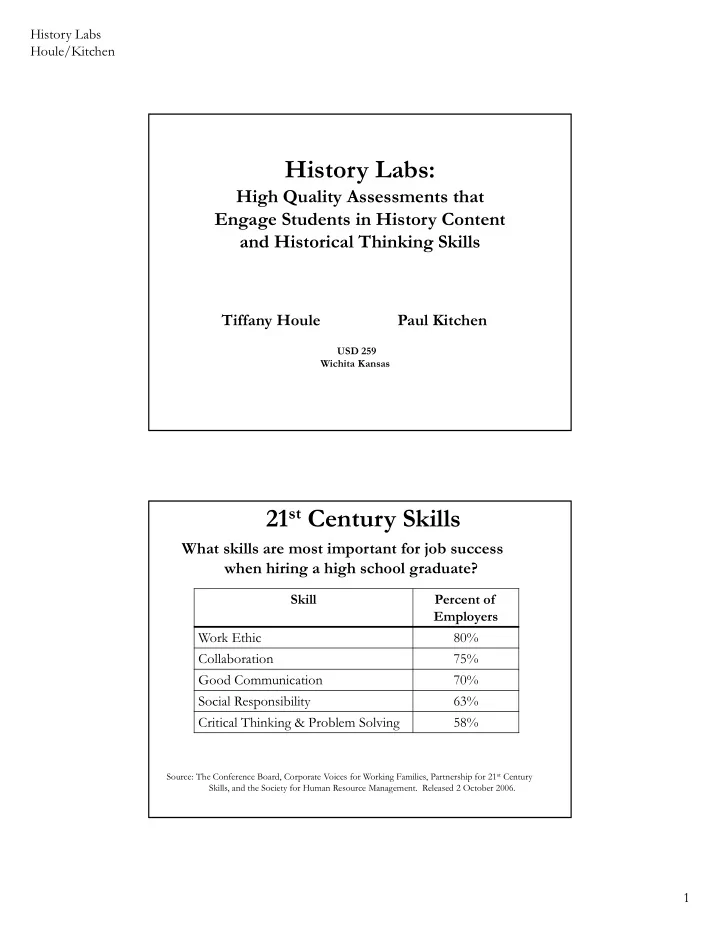

History Labs Houle/Kitchen History Labs: High Quality Assessments that Engage Students in History Content and Historical Thinking Skills Tiffany Houle Paul Kitchen USD 259 Wichita Kansas 21 st Century Skills What skills are most important for job success when hiring a high school graduate? Skill Percent of Employers Work Ethic 80% Collaboration 75% Good Communication 70% Social Responsibility 63% Critical Thinking & Problem Solving 58% Source: The Conference Board, Corporate Voices for Working Families, Partnership for 21 st Century Skills, and the Society for Human Resource Management. Released 2 October 2006. 1
History Labs Houle/Kitchen 21 st Century Learners 20 th Century 21 st Century # of Jobs 1-2 Jobs 10-15 Jobs Master of One Flexibility and Job Skill Field Adaptability Subject Matter Integration of 21 st Teaching Mastery Century Skills into Model Subject Matter Mastery Subject Matter Integration of 21 st Assessment Mastery Century Skills into Model Subject Matter Mastery Source: Number of Jobs Held and Labor Market Activity among Younger Baby Boomers: Recent Results from a Longitudinal Survey Summary, U.S. Department of Labor, 2004. 21 st Century Learners “In an age where ‘I found it on the Internet’ masquerades as knowledge, history serves as a vital counterweight to intellectual sloppiness.” Sam Wineburg, Reading Like a Historian, ix. 2
History Labs Houle/Kitchen 21 st Century Learners “Historians have developed powerful ways of reading that allow them to see patterns, make sense of contradictions, and formulate reasoned interpretations when others get lost in the forest of detail and throw up their hands in frustration.” Sam Wineburg, Reading Like a Historian, ix. Thinking Like a Historian W HAT IS H ISTORY ? History is an account of the past. • Accounts differ depending on one’s • perspective. We rely on evidence to construct accounts of • the past. We must question the reliability of each • piece of evidence. Any single piece • of evidence is insufficient to build a plausible account. 3
History Labs Houle/Kitchen Thinking Like a Historian S OURCING Before reading a document: Who produced this? • When was it produced? • Where was it produced? • Why was it produced (bias)? • What is the author’s perspective? • Who was the • intended audience? Is this source • reliable? Why? Why not? Thinking Like a Historian C ONTEXTUALIZING What was happening at the time this • document was produced? How might the circumstances in which the • document was created affect its content? How might the • document fit into the larger story of the development of the U.S.? Think about Themes 4
History Labs Houle/Kitchen Thinking Like a Historian C ORROBORATING What are other possible documents? • What do other documents say? • What conflicting historical evidence exists • among these documents? Why does this conflicting evidence exist? • What • supportable inferences and appropriate conclusions can be made? History Lab Text: The sentence itself. Pretext: The valid basis for the sentence, from previous events and experience. Context: How does the sentence apply to the specific, current factors of this situation? Subtext: What is not said? What is below the surface? What is soft, vague, or hard to quantify? 5
History Labs Houle/Kitchen Celebration of Knowledge Resources http://tinyurl.com/HistorianThinking http://tinyurl.com/HistorianThinking 6
Recommend
More recommend